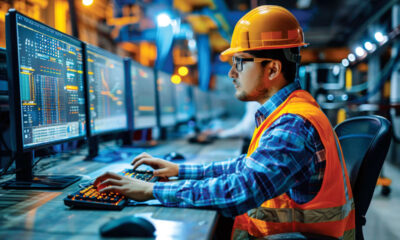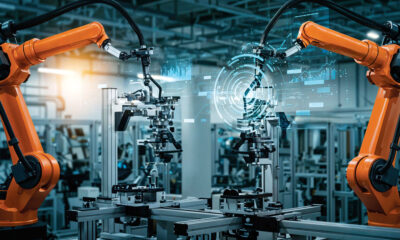Economy & Market
We are excited about the future
Published
2 years agoon
By
admin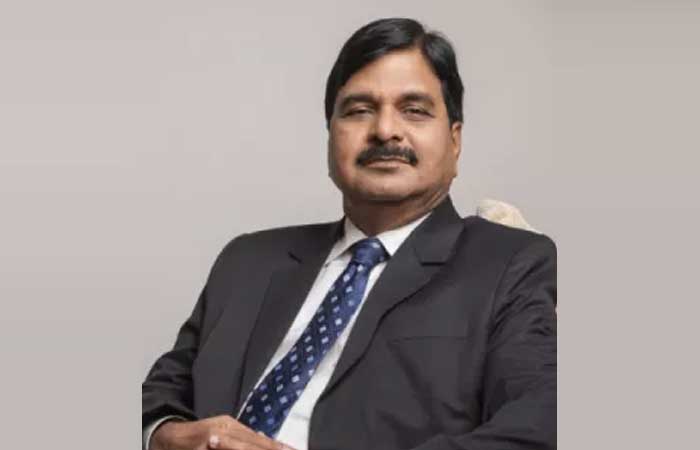
Kiran Patil, Managing Director, Wonder Cement, speaks about the company’s focus on technological advancements, sustainability and community development to support its growth while mitigating regulatory and economic challenges.
What are your company’s plans for expanding cement production capacity? How are they aligned with the government’s industrial and infrastructure policies?
In the short term, we are focusing on optimising our existing facilities and ensuring that we achieve maximum efficiency in production. Our short-term plan focuses on increasing our current production capacity by 25 per cent over the next two years to meet the rising demand for cement in infrastructure projects. This will involve brown/green field expansion, upgrading technology, enhancing operational efficiencies, and debottlenecking existing plants to achieve better throughput.
We are pleased to announce the establishment of a fifth production line at our Nimbahera facility in Chittorgarh, Rajasthan. This expansion, set to be operational by mid-2025, is in response to the growing demand in the region. The new line will augment our production capacity by an additional 2.75 MTPA.
In the long term, we aim to increase our capacity within the next five years by establishing new plants in strategic locations across the region. These plans align well with the government’s industrial and infrastructure policies, such as the National Infrastructure Pipeline (NIP) and the push for affordable housing. These initiatives are driving demand for construction materials, and we are committed to supporting these efforts by ensuring a steady supply of high-quality cement.
At Wonder Cement, we are committed to significantly expanding our production capacity to meet the growing demands of the Indian market and to contribute to the nation’s infrastructure development. Our expansion strategy is carefully aligned with the government’s industrial and infrastructure policies to ensure that our growth supports national priorities.
How have the current policies, such as the focus on infrastructure development and the ‘Make in India’ initiative, influenced your expansion plans?
The government’s emphasis on infrastructure development and the ‘Make in India’ initiative have significantly influenced our expansion plans. Policies like the NIP, which aims to enhance the quality of infrastructure across the country, have created a robust demand for construction materials. The ‘Make in India’ initiative has provided us with a favourable environment for manufacturing, encouraging us to invest more in local production. While these policies have been beneficial, the challenge lies in navigating the regulatory complexities and obtaining timely approvals for new projects. However, the government’s proactive approach in simplifying procedures and promoting ease of doing business has been encouraging.
What is your assessment of the current regulatory policies? Are there any initiatives that could help your expansion plans?
The current regulatory environment for the cement industry is generally supportive, but there is room for improvement. Simplifying and speeding up the process for environmental clearances and land acquisition would significantly facilitate our expansion plans. Additionally, policies aimed at reducing logistical costs through better infrastructure, such as improved rail and road networks, would help us optimise our supply chain and distribution. The government’s focus on digitisation and transparency in regulatory processes is a positive step that we believe will further ease the challenges associated with expansion.
How is your company securing funding for these projects, and what role do government incentives play in this process?
We are planning an investment of approximately Rs 5,000 crore over the next five to seven years to support our expansion initiatives. This includes the establishment of new plants, upgrading existing facilities, and incorporating advanced technologies. We are securing funding through a combination of internal accruals and external financing. Government incentives, such as subsidies for setting up plants in certain regions and tax benefits under the ‘Make in India’ initiative, play a crucial role in making these investments viable. These incentives help us manage costs and enhance the overall feasibility of our projects.
How is your company addressing sustainability in your expansion plans?
At Wonder Cement, environmental sustainability is a core principle guiding our expansion plans. As we increase our production capacity, we are committed to implementing measures that minimise environmental impact and promote sustainable practices. Here are the steps we are taking to ensure our new production line aligns with these values:
- Energy efficiency: We are incorporating state-of-the-art technology to enhance energy efficiency in our operations. This includes using advanced machinery that consumes less energy and optimising our processes to reduce energy wastage. We are focusing on green power for plant operation. Recently we signed an agreement for solar power supply for our newly established grinding unit at Aligarh, U.P.
- Emission control: We are investing in cutting-edge emission control systems to significantly reduce greenhouse gas emissions. Our new facility will be equipped with high-efficiency bag filters, electrostatic precipitators, and continuous emission monitoring systems to ensure compliance with stringent environmental standards.
- Alternative fuels and raw materials: We are increasing the use of alternative fuels and raw materials in our production process. This not only reduces our dependency on non-renewable resources but also helps in lowering our carbon footprint.
- Water conservation: Water is a precious resource, and we are committed to its conservation. Our new line will incorporate advanced water recycling systems and rainwater harvesting mechanisms to ensure sustainable water use.
- Waste management: We are implementing comprehensive waste management strategies to minimise waste generation and promote recycling. This includes utilising industrial waste, such as fly ash and slag, in our cement production to reduce landfill waste.
- Green belt development: We are enhancing our green belt around the Nimbahera facility by planting more trees and maintaining natural vegetation. This helps in improving air quality and creating a sustainable environment.
- Community engagement: We are engaging with local communities to promote environmental awareness and sustainability practices.
Through various CSR initiatives, we aim to educate and involve the community in our environmental efforts.
By integrating these initiatives into our expansion plans, we ensure that our increased production capacity is achieved in an environmentally responsible manner, contributing to the long-term sustainability of our operations and the well-being of the community.
How is your company leveraging technology to enhance efficiency and capacity in your cement plants?
At Wonder Cement, we leverage cutting-edge technology to enhance our plants’ efficiency and capacity through a multifaceted approach focusing on automation, digitalisation, and sustainability. Our Advanced Process Control (APC) systems optimise production with real-time data and predictive analytics, improving efficiency and reducing energy consumption. IoT-enabled devices facilitate real-time monitoring and predictive maintenance, minimising downtime and costs. Centralised control rooms utilise sophisticated software for effective oversight and quick decision-making.
We incorporate robotics for precise, efficient material handling and explore AI and machine learning to predict equipment failures and optimise maintenance. Our adoption of Waste Heat Recovery Systems (WHRS) harnesses waste heat, reducing external energy reliance and lowering our carbon footprint. Sustainability drives our technological innovations, including investments in carbon capture and alternative fuels.
In new and expanded facilities, we plan to integrate smart manufacturing technologies, blockchain for supply chain transparency, and digital twins for real-time performance optimisation. These innovations position Wonder Cement at the forefront of the industry, ensuring high-quality products while upholding our commitment to sustainability and operational excellence.
What are the major challenges and risks associated with expansion?
The major challenges include regulatory delays, fluctuations in raw material prices, and uncertainties in the economic and political landscape. To mitigate these risks, we are focusing on diversifying our supply chain to reduce dependency on a single source of raw materials and mode of transport. We are also engaging with government authorities to ensure timely clearances and support. Additionally, we are adopting a phased approach to expansion to allow flexibility and adaptability in response to changing market conditions. Risk management frameworks and contingency planning are integral parts of our strategy to navigate these challenges.
How do your expansion plans consider the impact on local communities?
Our expansion plans are designed with a strong focus on social and economic development of local communities. We prioritise hiring from local talent pools and provide extensive training programs to enhance their skills. Our Corporate Social Responsibility (CSR) initiatives include healthcare, education and infrastructure development in the regions surrounding our plants. We are also investing in community welfare programs such as building schools, and healthcare centres and ensuring access to clean drinking water. By engaging with local communities and addressing their needs, we aim to foster a positive and sustainable relationship.
Overall, this showcases our commitment to growth, sustainability, and community development while aligning with national policies and leveraging advanced technologies. Wonder Cement’s expansion plans are designed to not only meet the increasing demand for cement in India but also to support and complement the government’s vision for industrial growth and infrastructure development. We are excited about the future and are dedicated to playing a pivotal role in the nation’s progress.
– Kanika Mathur

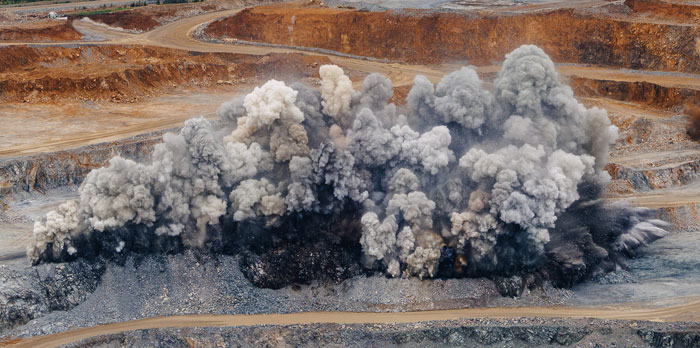
SEEPEX introduces BN pumps with Smart Joint Access (SJA) to improve efficiency, reliability, and inspection speed in demanding rock blasting operations.
Designed for abrasive and chemical media, the solution supports precise dosing, reduced downtime, and enhanced operational safety.
SEEPEX has introduced BN pumps with Smart Joint Access (SJA), engineered for the reliable and precise transfer of abrasive, corrosive, and chemical media in mining and construction. Designed for rock blasting, the pump features a large inspection opening for quick joint checks, a compact footprint for mobile or skid-mounted installations, and flexible drive and material options for consistent performance and uptime.
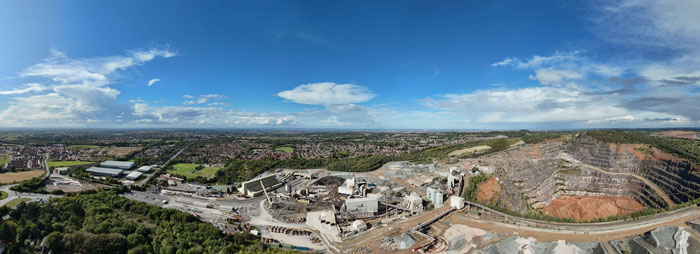
“Operators can inspect joints quickly and rely on precise pumping of shear-sensitive and abrasive emulsions,” said Magalie Levray, Global Business Development Manager Mining at SEEPEX. “This is particularly critical in rock blasting, where every borehole counts for productivity.” Industry Context
Rock blasting is essential for extracting hard rock and shaping safe excavation profiles in mining and construction. Accurate and consistent loading of explosive emulsions ensures controlled fragmentation, protects personnel, and maximizes productivity. Even minor deviations in pumping can cause delays or reduce product quality. BN pumps with SJA support routine maintenance and pre-operation checks by allowing fast verification of joint integrity, enabling more efficient operations.
Always Inspection Ready
Smart Joint Access is designed for inspection-friendly operations. The large inspection opening in the suction housing provides direct access to both joints, enabling rapid pre-operation checks while maintaining high operational reliability. Technicians can assess joint condition quickly, supporting continuous, reliable operation.
Key Features
- Compact Footprint: Fits truck-mounted mobile units, skid-mounted systems, and factory installations.
- Flexible Drive Options: Compact hydraulic drive or electric drive configurations.
- Hydraulic Efficiency: Low-displacement design reduces oil requirements and supports low total cost of ownership.
- Equal Wall Stator Design: Ensures high-pressure performance in a compact footprint.
- Material Flexibility: Stainless steel or steel housings, chrome-plated rotors, and stators in NBR, EPDM, or FKM.
Operators benefit from shorter inspection cycles, reliable dosing, seamless integration, and fast delivery through framework agreements, helping to maintain uptime in critical rock blasting processes.
Applications – Optimized for Rock Blasting
BN pumps with SJA are designed for mining, tunneling, quarrying, civil works, dam construction, and other sectors requiring precise handling of abrasive or chemical media. They provide robust performance while enabling fast, reliable inspection and maintenance.With SJA, operators can quickly access both joints without disassembly, ensuring emulsions are transferred accurately and consistently. This reduces downtime, preserves product integrity, and supports uniform dosing across multiple bore holes.
With the Smart Joint Access inspection opening, operators can quickly access and assess the condition of both joints without disassembly, enabling immediate verification of pump readiness prior to blast hole loading. This allows operators to confirm that emulsions are transferred accurately and consistently, protecting personnel, minimizing product degradation, and maintaining uniform dosing across multiple bore holes.
The combination of equal wall stator design, compact integration, flexible drives, and progressive cavity pump technology ensures continuous, reliable operation even in space-limited, high-pressure environments.
From Inspection to Operation
A leading explosives provider implemented BN pumps with SJA in open pit and underground operations. By replacing legacy pumps, inspection cycles were significantly shortened, allowing crews to complete pre-operation checks and return mobile units to productive work faster. Direct joint access through SJA enabled immediate verification, consistent emulsion dosing, and reduced downtime caused by joint-related deviations.
“The inspection opening gives immediate confidence that each joint is secure before proceeding to bore holes,” said a site technician. “It allows us to act quickly, keeping blasting schedules on track.”
Framework agreements ensured rapid pump supply and minimal downtime, supporting multi-site operations across continents
Concrete
Refractory demands in our kiln have changed
Published
2 weeks agoon
February 20, 2026By
admin
Radha Singh, Senior Manager (P&Q), Shree Digvijay Cement, points out why performance, predictability and life-cycle value now matter more than routine replacement in cement kilns.
As Indian cement plants push for higher throughput, increased alternative fuel usage and tighter shutdown cycles, refractory performance in kilns and pyro-processing systems is under growing pressure. In this interview, Radha Singh, Senior Manager (P&Q), Shree Digvijay Cement, shares how refractory demands have evolved on the ground and how smarter digital monitoring is improving kiln stability, uptime and clinker quality.
How have refractory demands changed in your kiln and pyro-processing line over the last five years?
Over the last five years, refractory demands in our kiln and pyro line have changed. Earlier, the focus was mostly on standard grades and routine shutdown-based replacement. But now, because of higher production loads, more alternative fuels and raw materials (AFR) usage and greater temperature variation, the expectation from refractory has increased.
In our own case, the current kiln refractory has already completed around 1.5 years, which itself shows how much more we now rely on materials that can handle thermal shock, alkali attack and coating fluctuations. We have moved towards more stable, high-performance linings so that we don’t have to enter the kiln frequently for repairs.
Overall, the shift has been from just ‘installation and run’ to selecting refractories that give longer life, better coating behaviour and more predictable performance under tougher operating conditions.
What are the biggest refractory challenges in the preheater, calciner and cooler zones?
• Preheater: Coating instability, chloride/sulphur cycles and brick erosion.
• Calciner: AFR firing, thermal shock and alkali infiltration.
• Cooler: Severe abrasion, red-river formation and mechanical stress on linings.
Overall, the biggest challenge is maintaining lining stability under highly variable operating conditions.
How do you evaluate and select refractory partners for long-term performance?
In real plant conditions, we don’t select a refractory partner just by looking at price. First, we see their past performance in similar kilns and whether their material has actually survived our operating conditions. We also check how strong their technical support is during shutdowns, because installation quality matters as much as the material itself.
Another key point is how quickly they respond during breakdowns or hot spots. A good partner should be available on short notice. We also look at their failure analysis capability, whether they can explain why a lining failed and suggest improvements.
On top of this, we review the life they delivered in the last few campaigns, their supply reliability and their willingness to offer plant-specific custom solutions instead of generic grades. Only a partner who supports us throughout the life cycle, which includes selection, installation, monitoring and post-failure analysis, fits our long-term requirement.
Can you share a recent example where better refractory selection improved uptime or clinker quality?
Recently, we upgraded to a high-abrasion basic brick at the kiln outlet. Earlier we had frequent chipping and coating loss. With the new lining, thermal stability improved and the coating became much more stable. As a result, our shutdown interval increased and clinker quality remained more consistent. It had a direct impact on our uptime.
How is increased AFR use affecting refractory behaviour?
Increased AFR use is definitely putting more stress on the refractory. The biggest issue we see daily is the rise in chlorine, alkalis and volatiles, which directly attack the lining, especially in the calciner and kiln inlet. AFR firing is also not as stable as conventional fuel, so we face frequent temperature fluctuations, which cause more thermal shock and small cracks in the lining.
Another real problem is coating instability. Some days the coating builds too fast, other days it suddenly drops, and both conditions impact refractory life. We also notice more dust circulation and buildup inside the calciner whenever the AFR mix changes, which again increases erosion.
Because of these practical issues, we have started relying more on alkali-resistant, low-porosity and better thermal shock–resistant materials to handle the additional stress coming from AFR.
What role does digital monitoring or thermal profiling play in your refractory strategy?
Digital tools like kiln shell scanners, IR imaging and thermal profiling help us detect weakening areas much earlier. This reduces unplanned shutdowns, helps identify hotspots accurately and allows us to replace only the critical sections. Overall, our maintenance has shifted from reactive to predictive, improving lining life significantly.
How do you balance cost, durability and installation speed during refractory shutdowns?
We focus on three points:
• Material quality that suits our thermal profile and chemistry.
• Installation speed, in fast turnarounds, we prefer monolithic.
• Life-cycle cost—the cheapest material is not the most economical. We look at durability, future downtime and total cost of ownership.
This balance ensures reliable performance without unnecessary expenditure.
What refractory or pyro-processing innovations could transform Indian cement operations?
Some promising developments include:
• High-performance, low-porosity and nano-bonded refractories
• Precast modular linings to drastically reduce shutdown time
• AI-driven kiln thermal analytics
• Advanced coating management solutions
• More AFR-compatible refractory mixes
These innovations can significantly improve kiln stability, efficiency and maintenance planning across the industry.
Concrete
Digital supply chain visibility is critical
Published
2 weeks agoon
February 20, 2026By
admin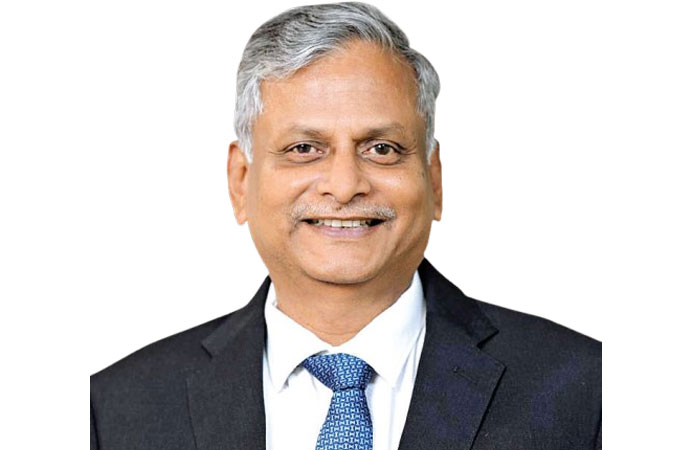
MSR Kali Prasad, Chief Digital and Information Officer, Shree Cement, discusses how data, discipline and scale are turning Industry 4.0 into everyday business reality.
Over the past five years, digitalisation in Indian cement manufacturing has moved decisively beyond experimentation. Today, it is a strategic lever for cost control, operational resilience and sustainability. In this interview, MSR Kali Prasad, Chief Digital and Information Officer, Shree Cement, explains how integrated digital foundations, advanced analytics and real-time visibility are helping deliver measurable business outcomes.
How has digitalisation moved from pilot projects to core strategy in Indian cement manufacturing over the past five years?
Digitalisation in Indian cement has evolved from isolated pilot initiatives into a core business strategy because outcomes are now measurable, repeatable and scalable. The key shift has been the move away from standalone solutions toward an integrated digital foundation built on standardised processes, governed data and enterprise platforms that can be deployed consistently across plants and functions.
At Shree Cement, this transition has been very pragmatic. The early phase focused on visibility through dashboards, reporting, and digitisation of critical workflows. Over time, this has progressed into enterprise-level analytics and decision support across manufacturing and the supply chain,
with clear outcomes in cost optimisation, margin protection and revenue improvement through enhanced customer experience.
Equally important, digital is no longer the responsibility of a single function. It is embedded into day-to-day operations across planning, production, maintenance, despatch and customer servicing, supported by enterprise systems, Industrial Internet of Things (IIoT) data platforms, and a structured approach to change management.
Which digital interventions are delivering the highest ROI across mining, production and logistics today?
In a capital- and cost-intensive sector like cement, the highest returns come from digital interventions that directly reduce unit costs or unlock latent capacity without significant capex.
Supply chain and planning (advanced analytics): Tools for demand forecasting, S&OP, network optimisation and scheduling deliver strong returns by lowering logistics costs, improving service levels, and aligning production with demand in a fragmented and regionally diverse market.
Mining (fleet and productivity analytics): Data-led mine planning, fleet analytics, despatch discipline, and idle-time reduction improve fuel efficiency and equipment utilisation, generating meaningful savings in a cost-heavy operation.
Manufacturing (APC and process analytics): Advanced Process Control, mill optimisation, and variability reduction improve thermal and electrical efficiency, stabilise quality and reduce rework and unplanned stoppages.
Customer experience and revenue enablement (digital platforms): Dealer and retailer apps, order visibility and digitally enabled technical services improve ease of doing business and responsiveness. We are also empowering channel partners with transparent, real-time information on schemes, including eligibility, utilisation status and actionable recommendations, which improves channel satisfaction and market execution while supporting revenue growth.
Overall, while Artificial Intelligence (AI) and IIoT are powerful enablers, it is advanced analytics anchored in strong processes that typically delivers the fastest and most reliable ROI.
How is real-time data helping plants shift from reactive maintenance to predictive and prescriptive operations?
Real-time and near real-time data is driving a more proactive and disciplined maintenance culture, beginning with visibility and progressively moving toward prediction and prescription.
At Shree Cement, we have implemented a robust SAP Plant Maintenance framework to standardise maintenance workflows. This is complemented by IIoT-driven condition monitoring, ensuring consistent capture of equipment health indicators such as vibration, temperature, load, operating patterns and alarms.
Real-time visibility enables early detection of abnormal conditions, allowing teams to intervene before failures occur. As data quality improves and failure histories become structured, predictive models can anticipate likely failure modes and recommend timely interventions, improving MTBF and reducing downtime. Over time, these insights will evolve into prescriptive actions, including spares readiness, maintenance scheduling, and operating parameter adjustments, enabling reliability optimisation with minimal disruption.
A critical success factor is adoption. Predictive insights deliver value only when they are embedded into daily workflows, roles and accountability structures. Without this, they remain insights without action.
In a cost-sensitive market like India, how do cement companies balance digital investment with price competitiveness?
In India’s intensely competitive cement market, digital investments must be tightly linked to tangible business outcomes, particularly cost reduction, service improvement, and faster decision-making.
This balance is achieved by prioritising high-impact use cases such as planning efficiency, logistics optimisation, asset reliability, and process stability, all of which typically deliver quick payback. Equally important is building scalable and governed digital foundations that reduce the marginal cost of rolling out new use cases across plants.
Digitally enabled order management, live despatch visibility, and channel partner platforms also improve customer centricity while controlling cost-to-serve, allowing service levels to improve without proportionate increases in headcount or overheads.
In essence, the most effective digital investments do not add cost. They protect margins by reducing variability, improving planning accuracy, and strengthening execution discipline.
How is digitalisation enabling measurable reductions in energy consumption, emissions, and overall carbon footprint?
Digitalisation plays a pivotal role in improving energy efficiency, reducing emissions and lowering overall carbon intensity.
Real-time monitoring and analytics enable near real-time tracking of energy consumption and critical operating parameters, allowing inefficiencies to be identified quickly and corrective actions to be implemented. Centralised data consolidation across plants enables benchmarking, accelerates best-practice adoption, and drives consistent improvements in energy performance.
Improved asset reliability through predictive maintenance reduces unplanned downtime and process instability, directly lowering energy losses. Digital platforms also support more effective planning and control of renewable energy sources and waste heat recovery systems, reducing dependence on fossil fuels.
Most importantly, digitalisation enables sustainability progress to be tracked with greater accuracy and consistency, supporting long-term ESG commitments.
What role does digital supply chain visibility play in managing demand volatility and regional market dynamics in India?
Digital supply chain visibility is critical in India, where demand is highly regional, seasonality is pronounced, and logistics constraints can shift rapidly.
At Shree Cement, planning operates across multiple horizons. Annual planning focuses on capacity, network footprint and medium-term demand. Monthly S&OP aligns demand, production and logistics, while daily scheduling drives execution-level decisions on despatch, sourcing and prioritisation.
As digital maturity increases, this structure is being augmented by central command-and-control capabilities that manage exceptions such as plant constraints, demand spikes, route disruptions and order prioritisation. Planning is also shifting from aggregated averages to granular, cost-to-serve and exception-based decision-making, improving responsiveness, lowering logistics costs and strengthening service reliability.
How prepared is the current workforce for Industry 4.0, and what reskilling strategies are proving most effective?
Workforce preparedness for Industry 4.0 is improving, though the primary challenge lies in scaling capabilities consistently across diverse roles.
The most effective approach is to define capability requirements by role and tailor enablement accordingly. Senior leadership focuses on digital literacy for governance, investment prioritisation, and value tracking. Middle management is enabled to use analytics for execution discipline and adoption. Frontline sales and service teams benefit from
mobile-first tools and KPI-driven workflows, while shop-floor and plant teams focus on data-driven operations, APC usage, maintenance discipline, safety and quality routines.
Personalised, role-based learning paths, supported by on-ground champions and a clear articulation of practical benefits, drive adoption far more effectively than generic training programmes.
Which emerging digital technologies will fundamentally reshape cement manufacturing in the next decade?
AI and GenAI are expected to have the most significant impact, particularly when combined with connected operations and disciplined processes.
Key technologies likely to reshape the sector include GenAI and agentic AI for faster root-cause analysis, knowledge access, and standardisation of best practices; industrial foundation models that learn patterns across large sensor datasets; digital twins that allow simulation of process changes before implementation; and increasingly autonomous control systems that integrate sensors, AI, and APC to maintain stability with minimal manual intervention.
Over time, this will enable more centralised monitoring and management of plant operations, supported by strong processes, training and capability-building.

World Cement Association Annual Conference 2026 in Bangkok

Assam Chief Minister Opens Star Cement Plant In Cachar

Adani Cement, NAREDCO Form Strategic Alliance

Walplast’s GypEx Range Secures GreenPro Certification

Smart Pumping for Rock Blasting

World Cement Association Annual Conference 2026 in Bangkok

Assam Chief Minister Opens Star Cement Plant In Cachar

Adani Cement, NAREDCO Form Strategic Alliance

Walplast’s GypEx Range Secures GreenPro Certification

Smart Pumping for Rock Blasting
Trending News
-

 Economy & Market1 month ago
Economy & Market1 month agoBudget 2026–27 infra thrust and CCUS outlay to lift cement sector outlook
-

 Economy & Market4 weeks ago
Economy & Market4 weeks agoFORNNAX Appoints Dieter Jerschl as Sales Partner for Central Europe
-

 Concrete2 weeks ago
Concrete2 weeks agoRefractory demands in our kiln have changed
-
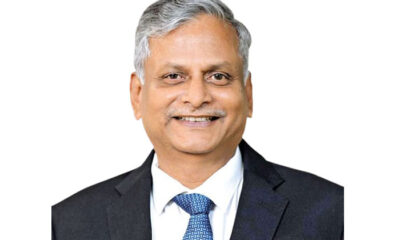
 Concrete2 weeks ago
Concrete2 weeks agoDigital supply chain visibility is critical


